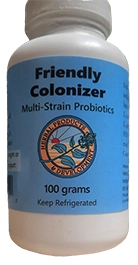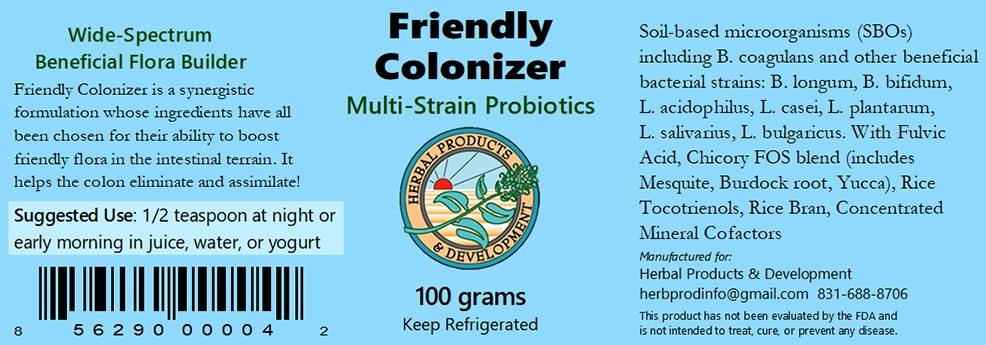Multi-Strain Probiotics
Our intestinal tract is home to trillions of bacteria comprising hundreds of beneficial species. These “friendly” microorganisms are called probiotics which means “for life.” That expresses exactly their benefit to us. Studies have shown that probiotics play a vital role in our health and well-being.
While few microorganisms are found in the stomach due to its high acidity, their numbers increase dramatically further down the intestinal tract. The greatest numbers and varieties are in the large intestine. When these microbial populations are in balance, we reap the benefits of optimum health. Friendly microorganisms keep harmful, pathogenic species in check. Without enough friendly bacteria, our intestinal terrain is off balance which can lead to a range of health problems and diseases.

Friendly bacteria attach to the intestinal wall and produce a mildly acidic environment that curbs the growth of harmful, disease-causing bacteria. As they colonize the intestinal tract, they protect against harmful species. Probiotics are also essential in nutrient assimilation. They break down nutrients into micronutrients which produce many important enzymes and increase the bioavailability of vitamins (particularly Bs and K), fatty acids, lactose, and calcium. Other benefits of probiotics include strengthening of the immune system, neutralization of toxins, normalization of bowel movements, cholesterol control, allergies resistance. Probiotics have also been used to alleviate chronic fatigue syndrome and to normalize weight.
We need to encourage the growth of probiotic flora in our intestinal terrain. It must be abundant for proper health. Today, many influences can ravage our intestinal soil such as a poor diet, antibiotics use, pathogenic contamination, pollutants, and stress. A diet rich in complex carbohydrates, adequate protein, vegetables, and essential fatty acids supported by cultured foods such as yogurt, miso, or acidophilus milk, promotes friendly microflora. When our diet does not lead to proper intestinal balance and adverse conditions threaten it, probiotic supplements are highly recommended. With adequate probiotics, the overgrowth of harmful pathogens can be eliminated.
Our Friendly Colonizer is a synergistic formula in which all ingredients have been chosen for their ability to work together to enhance our intestinal terrain. The foundation for our Friendly Colonizer is multi-strain soil-based microorganisms. The availability of beneficial soil-based microorganisms (SBOs) in our diet has been greatly reduced through modern agricultural techniques. SBOs are ingested when we eat fresh, raw, organic plant life grown in rich soils which are not all that common today. Our SBOs have been selectively bred to produce internally the rich, balanced “soil” that we so often lack. Living soil—teeming with beneficial microorganisms—is the energy field that transmutes nutrients into well-being and longevity.
Our soil-based microorganisms survive stomach acids to reach the intestinal tract where they form colonies that attach to the intestinal wall. Within a short period, these colonies multiply themselves along the entire length of the intestinal tract and quickly create a favorable terrain for nutrient assimilation and the elimination of putrefying matter and pathogenic organisms. By cleaning up the colon, SBOs enhance the immune system. They also aggressively devour pathogenic microbes. This helps relieve the immune system and allows it to work more efficiently elsewhere in the body. SBOs also stimulate the body to produce large reservoirs of nonspecific antibodies which the immune system can then use. SBOs also stimulate our body’s production of alpha-interferon, a key regulator of our immune response. In addition, lactoferrin production is stimulated. Lactoferrin is an iron-binding protein that makes the iron we absorb from food bioavailable and allows the body to transfer it to wherever it is needed. It also inhibits pathogenic growth by depriving pathogens of iron.
Friendly Colonizer Ingredients — Beneficial bacterial strains:
Bacillus Coagulans (Bacillus Subtilis): A good lactic acid producer, proven very effective in combination with other strains. Known for its ability to modify LDL-cholesterol levels in the body. A hearty strain that helps control the growth of pathogens and is aggressive against candida.
Bifidobacteria Longum: A Japanese-developed strain found in infants that detoxifies and helps suppress harmful microbes, benefits the immune system, and reduces the burden on the liver. Increases peristalsis in the large intestine. Helps produce a wide range of B vitamins, breaks down sugars into lactic and acetic acids which suppress abnormal fermentation in the intestinal tract, and mitigates lactose tolerance. Also helps reduce candida albicans and improve the integrity of the mucosal membrane.
Bifidobacteria Bifidum: Bifidobacteria are the primary bacteria found in breast-fed infants. Benefits the mucosal lining of the colon, helps produce B vitamins, helps metabolize calcium, and aids liver conditions. Lactobacillus acidophilus including DDS-1: Best known of the friendly bacteria. Important in maintaining a healthy, balanced flora in the small intestine. Promotes the digestion of milk sugar (lactose) and assists with the production of vitamins and enzymes. Produces lactic acid, suppresses harmful microbes in the intestine, and helps control yeast overgrowth.
Lactobacillus acidophilus including DDS-1: Best known of the friendly bacteria. Important in maintaining a healthy, balanced flora in the small intestine. Promotes the digestion of milk sugar (lactose) and assists with the production of vitamins and enzymes. Produces lactic acid, suppresses harmful microbes in the intestine, and helps control yeast overgrowth.
Lactobacillus Casei (includes Rhamnosus): Highly prolific, hardy, and the most potent of all lactobacillus strains. It produces lactic acid and digests carbohydrates. Strengthens the immune response and Improves the integrity of the mucosal lining. Studies have demonstrated that it can help with leaky gut and intestinal dysbiosis.
Lactobacillus Plantarum: Has a high digestive capacity, particularly for breaking down proteins. It eliminates protein wastes from the intestine before they enter the bloodstream which benefits the immune system. It adheres strongly to the intestinal lining. Produces lactic acid and acts as a natural antibiotic (as acidophilic).
Lactobacillus Salivarius: Effective in eliminating symptoms of bowel toxemia. Produces B vitamins, Vitamin K, enzymes, and lactic acid. Aids in the production of lactase. Is very active on proteins as well as the by-products of protein putrefaction. Can be helpful for food poisoning.
Lactobacillus Bulgaricus: Used in yogurt start-up culture. Produces lactic acid. Enhances digestion of milk sugar. Has natural antibiotic properties.
Lactobacillus Lactis: Works with other probiotic strains. Helps to restore proper bowel function.
Additional Ingredients
Fulvic Acid: A powerful co-factor passing into cells instantly, creating the ideal environment for mineral complexes. Elements are easily transported through cell membranes for essential biochemical processes. It charges, regenerates, regulates, and delivers nutrient energies directly into cells. It detoxifies pollutants and is antimicrobial, antiviral, and antifungal. Provides trace minerals that help balance electrolytes and boost the immune system. The Humate blend is utilized by Fulvic acid.
Humate Mineral Blend: Includes soil-based organisms (see bacterial strains mentioned above).
FOS Blend: Contains Chicory, Mesquite, Burdock root, and Yucca powder. Fructooligosaccharides (FOS) are complex carbohydrates not broken down by our digestive system; instead, upon reaching the lower intestines, they become food for beneficial bacteria. FOS are known as prebiotics because of their ability to promote the growth of probiotic bacteria.
Rice Tocotrienols: Tocotrienols are an excellent delivery nutritive that brings our probiotic complex into the gastrointestinal system. They are high in vitamin E, have antioxidant properties, and are known for their cholesterol-inhibiting properties.
Rice Bran: A small amount of rice bran provides fiber, high minerals, protein, and B vitamins.

Sizes and Suggested Use
Sizes: 100 grams (jar), 1/2 pound, 1 pound (heat-sealed bags)
Suggested Use: 1/2 tsp. at night or early morning before breakfast in juice, water, or yogurt.
